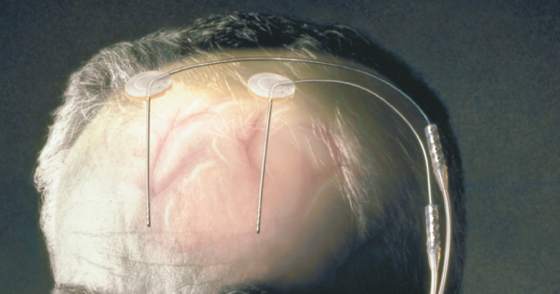The discussion as to whether guidelines are necessary in medicine is controversial, especially for the field of psychiatry, in which the relationship between doctor and patient plays a significant role, and almost resembles a question of faith. The training event on March 14 in Zurich was characterized by instructive lectures and a lively discussion, which also benefited from the refreshing manner of TV presenter Kurt Aeschbacher, who gave the event a special touch.
Psychiatric guidelines have only existed in Switzerland for about three years, as formulation in this area was relatively difficult for a long time. And even today, the fundamental controversy among physicians remains: “Do we need guidelines? Are they helpful in the everyday clinical practice of individualized medicine? Or do they rather limit us?” These questions were posed by Prof. Erich Seifritz, MD, Director of the Clinic for Psychiatry, Psychotherapy and Psychosomatics, Zurich, as an introduction to the continuing education event “Guidelines in Psychiatry: Necessary?” held in Zurich in March.
Formalization improves diagnosis
For Dr. phil. Lars Hölzel, head of the Clinical Epidemiology and Health Services Research Group at Freiburg University Hospital, says that “treatment guidelines are the be-all and end-all of any therapy in psychiatry”. Dr. Hölzel sees great potential for improvement above all in the recognition and diagnosis of therapies in outpatient and inpatient care. This does not necessarily require new treatment approaches, “but rather the existing ones should be systematically applied.” Especially in the case of depression, guidelines are of great importance in this respect, as its labor-intensive treatment is increasingly becoming a clinical “hotspot” from an epidemiological and health economic point of view.
In a project on comprehensive outpatient quality management, it was shown that there is a considerable gap between the GP diagnosis and the recorded PHQ score (Patient Health Questionnaire) of patients: GPs did not make the diagnosis of “depression” in around one in four patients who reported symptoms of depression, although this would have been indicated. However, concordance improved markedly after GPs underwent guideline-based training: one year after training, the value of concordant diagnoses actually doubled. Formalization thus seems to facilitate correct diagnosis.
Dr. Hölzel further criticized, among other things, the lack of binding and consistent indication criteria for different settings and their interfaces. For example, outpatient care providers, acute care hospitals, and rehabilitation facilities are inadequately networked, causing inefficient service delivery in many cases. At Freiburg University Hospital, a model procedure was used to test whether care would be improved by formalization. In this so-called “Freiburg IV model,” the main goal was to improve care and coordination between primary care physicians, specialists, and clinics, each of which traditionally follows different treatment models. Here it was shown that in 25% of the cases an inpatient admission was prevented because adequate treatment was also possible on an outpatient basis. A very positive but unexpected result was the 62% remission rate within 16 weeks. In this example, then, it is certainly possible to speak of a significant benefit of formalized treatment for depression.
Guidelines must not restrict physicians in terms of quality
Prof. Dr. med. Dr. phil. In contrast, Paul Hoff, chief physician and deputy clinical director of the Department of Psychiatry, Psychotherapy, and Psychosomatics at the Psychiatric University Hospital in Zurich, expressed skepticism about the unreflective overvaluation of guidelines and advocated the critical appraisal of formalized treatments. First, Prof. Hoff emphasized that although the so-called EBM (evidence-based medicine), on the basis of which guidelines are drawn up, is based on evidence, this itself is a result of systematic evaluation of published scientific results and not a mere enumeration. Consequently, guidelines are the result of a review and assessment of current scientific knowledge: “An assessment process is not a purely quantitative one, and EBM is not a final outcome, but always a process,” says Prof. Hoff.
Further, psychiatry as a discipline has certain inherent characteristics that make the handling of guidelines almost automatically controversial. Psychiatry oscillates between the art of healing and science. These two faces of psychiatry are, on the one hand, the primacy of the qualitative, characterized by subjectivity and an individual approach to an individual patient, and, on the other hand, the primacy of the quantitative, which has a law-based approach and close links with the natural sciences. “Unlike somatic subjects, psychiatry is closely intertwined with social and political developments, resulting in significantly more controversial positions.” What is considered crazy or mentally ill and what is not? The models of illness in psychiatry are in a constant state of change due to the interconnectedness to society – if in 1750 one still spoke of illness of reason, later of existential otherness, today it is the bio-psycho-social model of illness. This heterogeneity of the discipline further complicates the formulation of guidelines and greatly exacerbates the evidence-based nature of psychiatry.
In turn, Prof. Hoff noted positively that guidelines make decision-making more transparent for physicians and patients, facilitate the transfer of research into practice, and also serve as an important legal safeguard for treating psychiatrists. However, he countered that the transformation of publications into guidelines is far from a trivial process and that the decisive factors for the final product are who sits on the committee and what standards and criteria are applied. Furthermore, guidelines do not contain anything about combination therapies and off-label use, for example – but these are certainly practice-relevant topics. Prof. Hoff pointed out that “no data does not automatically mean no effect. In addition, negative findings are often not published and therefore cannot be included in guidelines. He also criticized the methodology of meta-analyses, saying that the pooling of study populations only tells us something about efficacy, but not necessarily about effectiveness, i.e. the actual effect in practice.
According to Prof. Hoff, the main task of guidelines is to reduce the likelihood of wrong decisions that may result from a lack of or biased knowledge. “The physician’s and patient’s scope for decision-making may only be restricted quantitatively, but not qualitatively.” This includes the type of relationship exchange, therapy planning, and also intuition and experience of physicians that enable personalized treatment of individual patients: A sustainable doctor-patient relationship should be the focus even with the existence of guidelines.
Guidelines are the solution for severe disorders
Prof. Dr. med. Martin Bohus, Medical Director of the Clinic for Psychosomatic and Psychotherapeutic Medicine at the Central Institute for Mental Health in Mannheim, gave the audience a brief outline of various studies to show that, contrary to popular belief, psychotherapy does not always have to be good. Guidelines can uncover unknown circumstances and break down entrenched ways of doing things that work along the lines of “we’ve always done it this way.” Guidelines also serve a function when psychologists find that they are limited by them in their personal degrees of freedom. Because at the latest when this is established, physicians should critically question their own working methods. Here, too, guidelines could create a kind of wake-up call.
On the other hand, guidelines are often formulated in very general terms and tend to resemble a zero statement. “This will not greatly influence your decision as a psychiatrist, for or against a particular therapy,” Prof. Bohus assessed. Furthermore, problems also arise from guidelines if, for example, they indicate a form of therapy as the treatment of first choice, but some physicians do not master it, or do so only inadequately. But if these therapists now adhere to the guideline and apply a therapy that is rather foreign to them, this is not necessarily good: “We psychiatrists already have a rather high tendency to believe ourselves. And rightly so, because the most important placebo effect is the therapist’s expectations: If you are convinced of what you are doing, that has a positive effect on the outcome of the treatment.”
But when do guidelines offer real added value? According to Prof. Bohus, an “appropriate balance between guideline knowledge and personalized therapy knowledge” is required here. Most robust studies indicate that even under optimal conditions, clinically reliable change is achieved in no more than 30%, and most mental disorders must probably be understood as potentially chronic disorders. The determining factor in whether or not guidelines seem appropriate, he said, is the severity of the mental disorder. If it is a mild disease, a very large variance, due to different patient-specific characteristics, can be observed. However, the more severe the mental disorder, the more homogeneous the patient population becomes and individual differences recede into the background: “Here, medicine should urgently draw up guidelines and prepare a treatment regimen according to evidence-based criteria.”
Source: Psychiatry Symposium. “Guidelines in psychiatry: necessary?” Zurich, March 14, 2013











